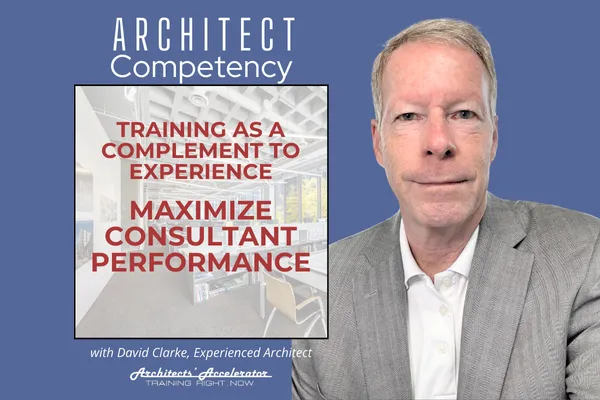
Training as a Complement to Experience - 3 Maximize Consultant Performance
One of the most difficult things architects do is managing consultants, engineers, interior designers, landscape designers, all kinds of specialty consultants.
We work with a lot of different people who are very specialized in what they do, and they're very good. But …
Why is it that they miss your deadlines?
Why is it that when you get the drawings from them, you notice inconsistencies, lack of collaboration, even within the same company, between like electrical and mechanical.
Why has it been your responsibility to look for things like their spelling errors on their drawings or their graphics to make it read well.
The architect’s job is to coordinate all consultants. But if you're struggling with consultants, missing deadlines, giving you poor quality, not being responsive, not even replying to your emails or your phone calls. You need a little help.
Your mentors in your office may be struggling with the same thing. They may just say, “Well, you’ve just got to stay on them." What does that even mean? “Just stay on them.” You need a plan. You need a specific strategy for dealing with that.
And this is where training can be a compliment to the experiences that you're having.
So even if you've been working with consultants for a while, I developed this course called, Maximize Consultant Performance
It’s designed to specifically deal with this issue.
• If you have no experience managing consultants or leading consultants
• if you have no experience in project management at all
• if you've been managing consultants for quite a while and struggling with this This course may really help you.
You can get it at https://architectsaccelerator.com/maxconsultants.
I designed it specifically to address the problems that architects have, commonly with dealing with consultants, and how to avoid those, how to correct them.
There's 10 lessons in this course that's an hour and a half long.
I show you contracts
I teach systems for communication and collaboration
I explain how to fire consultants
I teach you how to leverage free consultants
And the course concludes with Success Action Work, the things that you can do right now to put these strategies that you've just learned into practice during your experience at work.
To tie it back to competency, this particular course specifically addresses three of the competencies, 11, 12, and 13.
Competency 11 deals with executing contracts for professional services. And one of the bullet points is explain different types of contracts, including the consultant contracts.
I have a training that specifically deals with that within this course, and then understand basic risk implications of common terms and conditions. This is part of that training as well. I dig deep into terms and conditions and how to find them and how to understand them.
Competency 12, is to implement a work plan. This is developing a plan of action for a project and how to coordinate the consultants where you're collaborating with consultants to align your expectations.
I include specific training on developing expectations, and then how to get those expectations met.
Competency 13 is to organize and coordinate an interdisciplinary project team. It’s very specific to working with consultants, where you're identifying qualified consultants, you're facilitating communication and collaboration of consultants, and you implement processes to assess the quality of the work throughout a project.
All these are addressed in this course. Maximize Consultant Performance. https://architectsaccelerator.com/maxconsultants
This course is probably the most valuable course and all of them that I have because you can put it to work right now for you.
